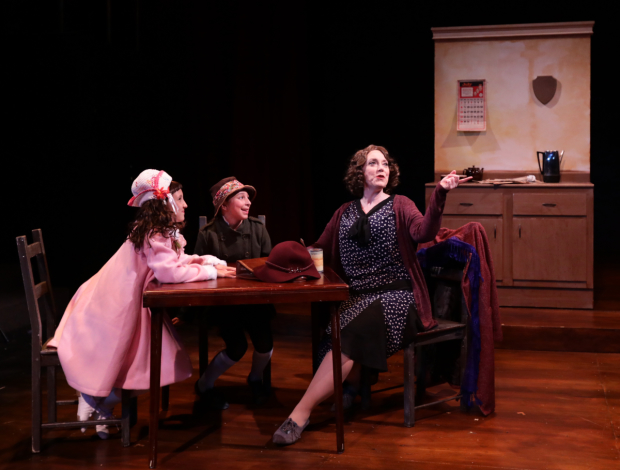Gypsy

(© Mark S. Howard)
As the overture to Gypsy sounds its first chords, a ghost light throws shadows across a faded theater while a ballroom dance couple glides onstage, followed by two hoofers. Scenic designer Janie E. Howland captures the sense of the era by topping the intimate space with an elaborate but damaged proscenium arch. Just before the lights come up, Mama Rose, clutching the hands of her two little girls, enters, looks around as if to warn the world that she is coming, and leaves — for only a moment.
Thus begins the Lyric Stage revival of Arthur Laurents, Jule Styne, and Stephen Sondheim's Gypsy, directed and choreographed by Rachel Bertone. Although there’s not much that can go wrong with one of the American musical theater’s most revered shows, Bertone nails her job by setting a brisk pace to the nearly three-hour homage to the vanishing tradition of vaudeville.
Based on the memoirs of Gypsy Rose Lee, Gypsy unfolds over the years between the sisters’ debut in vaudeville and the emergence of Louise as a sensation on the mid-20th century burlesque stage.
Their mother, single after three failed marriages and bored with humdrum life in their hometown of Seattle, puts together a vaudeville act featuring the talented Baby June (played by the gifted child performer Margot Anderson-Song), and her ugly-duckling sister, Louise (the appealing Cate Galante) and hits the road. But Mama Rose, for all her true grit, has the timing wrong. She leaves home with the children as vaudeville is done in by the swift emergence of talking films. But Mama Rose is determined to get to the top, no matter where that road takes her and her daughters.
As their story unfolds, the child actors morph into adolescents, with Kira Troilo as Baby June growing up and escaping the stage life with one of the boys from their act (Brady Miller). Kirsten Salpini plays the nearly adult Louise in a way that's perhaps too subdued for her later transformation. Louise is now in her mother’s sights for reluctant stardom but a poor substitute for June. Ultimately, as Gypsy Rose Lee, she finds her niche with a striptease act that leads her viewers along by only a teasing glimpse of her flesh. She’s learned some tricks from the scene-stealing trio of strippers in their second-act number, "You Gotta Get a Gimmick," belted out by Kathy St. George, the trumpet-playing gladiator, helped by the electrified (literally) Jordan Clark and Shannon Lee Jones as the kindly butterfly ballerina endowed with a grinding torso.
But it is the casting of Leigh Barrett as Mama Rose that truly makes this Gypsy sing. Barrett is the fulcrum of the emotional action — a stage mother from hell, of course, but filled with a compelling life force that makes you warm to her. According to Herbie, her wannabe husband (played with perfect passivity and silent seething by Steven Barkheimer), "You look like a pioneer woman without a frontier." Only we are all aware that this woman's frontier is the stage. Barrett gives the eleven o’clock anthem, "Rose’s Turn," a heart-stopping performance.
If there’s a flaw in Laurents’s script, it lies in the final scene, where Rose has a sentimental reunion between her and her daughter, making the finale feel redundant. The audience needs no help to understand that Rose is a survivor, one who will make it on her own without the help of the daughters who have left her behind.











